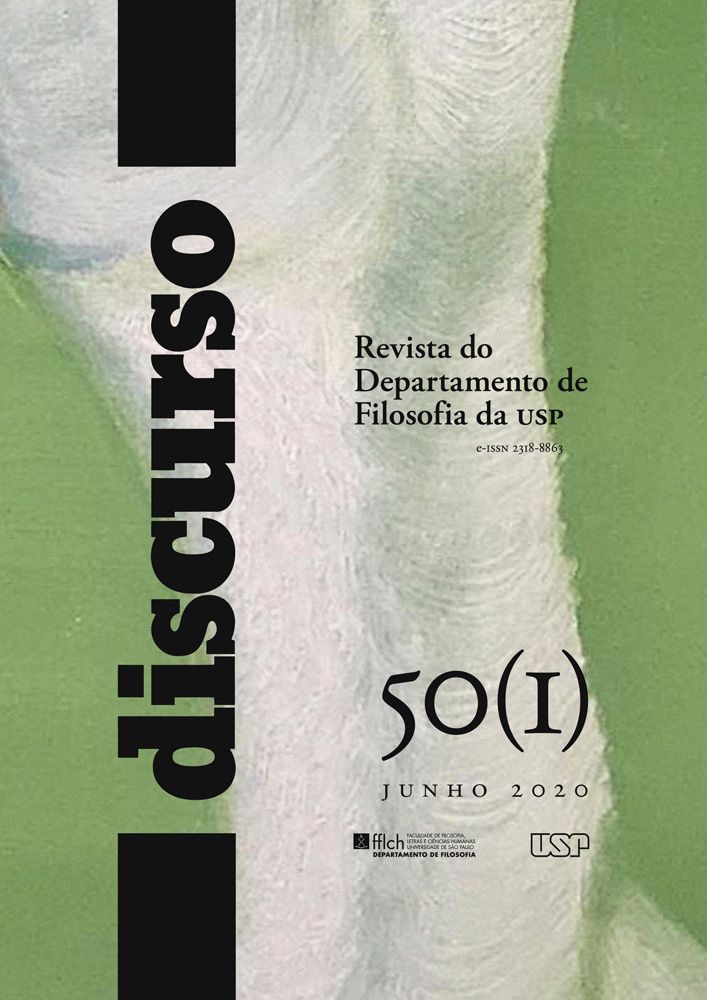Dualities and Tensions in Goethe’s Faust. An Essay
DOI:
https://doi.org/10.11606/issn.2318-8863.discurso.2020.171572Keywords:
Goethe, Tragedy, Faust, PolarityAbstract
This essay aims to present the dualities found in the first movements of Faust’s finished edition as constituent elements of the formation of the whole of the work. It is the dual characterization itself that guarantees the work the status of a tragedy. Seeking to establish relations with the polarities addressed by Goethe, this dual reading is done according to some theoretical postulates of the author himself and is a tool that helps the understanding of this lifetime work.
Downloads
References
Campos, H. (1981). Deus e o diabo no Fausto de Goethe. São Paulo: Perspectiva.
Cassirer, E. (1998). El problema del conocimiento IV. Tradução de Wenceslao Roces. México D. F.: Fondo de cultura económica.
Goethe, J. W. (1993a). A metamorfose das plantas. Tradução de Maria Filomena Molder. Lisboa: Imprensa Nacional — Casa da moeda,.
Goethe, J. W. (2000). Escritos sobre literatura. Tradução Pedro Süssekind. Rio de Janeiro: Editora 7 letras.
Goethe, J. W. (1994). Faust (2 v.) (Albrecht Schöne — Organização e comentários). Sämtliche Werke. Briefe Tagebücher und Gespräche, v. 15. Frankfurt am Main: Deutscher Klassiker Verlag.
Goethe, J. W. (2000). Fausto. Tradução de João Barrento. Lisboa: Relógio d´água.
Goethe, J. W. (1996). Fausto. Tradução de Agostinho d´Ornellas. Lisboa: Relógio d’água.
Goethe, J. W. (2004). Fausto. Tradução de Jenny Klabin Segall. São Paulo: Editora 34.
Goethe, J. W. (1997). Máximas e reflexões. Tradução de Afonso Teixeira da Mota. Lisboa: Guimarães Editores.
Goethe, J. W. (1993b). Schriften zur Morphologie. Sämtliche Werke. Briefe Tagebücher und Gespräche, v. 24. Frankfurt am Main: Deutscher Klassiker Verlag.
Goethe, J. W. Viagem à Itália. (1999). Tradução de Sérgio Tellaroli. São Paulo: Cia. Das Letras.
Leibniz. G. W. (2017). Ensaios de Teodicéia. Tradução de William Piauí e Juliana Cecci. São Paulo: Estação Liberdade.
Molder, M. F. (2017). Dia alegre, dia pensante, dia fatal. Lisboa: Relógio d´água.
Molder, M. F. (1995). O pensamento morfológico de Goethe. Lisboa: Imprensa Nacional — Casa da moeda.
Monzani, L. R. (1995). Desejo e prazer na idade moderna. Campinas: Ed. Unicamp.
Österkamp. E. (2000). “Amor e violência: a natureza de Fausto”. In: Galle e Mazzari (org.). Fausto e a américa Latina. São Paulo: Humanitas.
Platão. (2001). A República. Aristóteles. Poética. Tradução de Maria Helena da Rocha Pereira. Lisboa: Calouste Gulbenkian.
Schelling, W. F. (1974). Cartas sobre o dogmatismo e o criticismo. Os pensadores, v. xxvi. Tradução de R. R. Torres Filho. São Paulo: Abril Cultural.
Schiller, F. (2018). Objetos Trágicos, objetos estéticos. Tradução de Vladimir Vieira. Belo Horizonte: Autêntica.
Suzuki, M. (2005). “A ciência simbólica do mundo”. In: Novaes. A. (org.). Poetas que pensaram o mundo. São Paulo: Cia das Letras.
Winckelmann, J. J. (2011) Monumenti antici Inediti spiegate ed ilustrati. Mainz: Philipp von Zabern Verlag.
Downloads
Published
Issue
Section
License
O trabalho da Discurso foi licenciado com uma Licença Creative Commons Attribution-NonCommercial-ShareAlike 4.0 International.
Os autores aqui publicados mantém os direitos sobre seus artigos
De acordo com os termos seguintes:
-
Atribuição [BY] — Deve-se dar o crédito apropriado, prover um link para a licença e indicar se mudanças foram feitas.
-
NãoComercial [NC] — É proibido o uso deste material para fins comerciais.
-
CompartilhaIgual [SA] — Caso haja remixagem, transformação ou criação a partir do material, é necessário distribuir as suas contribuições sob a mesma licença que o original.




